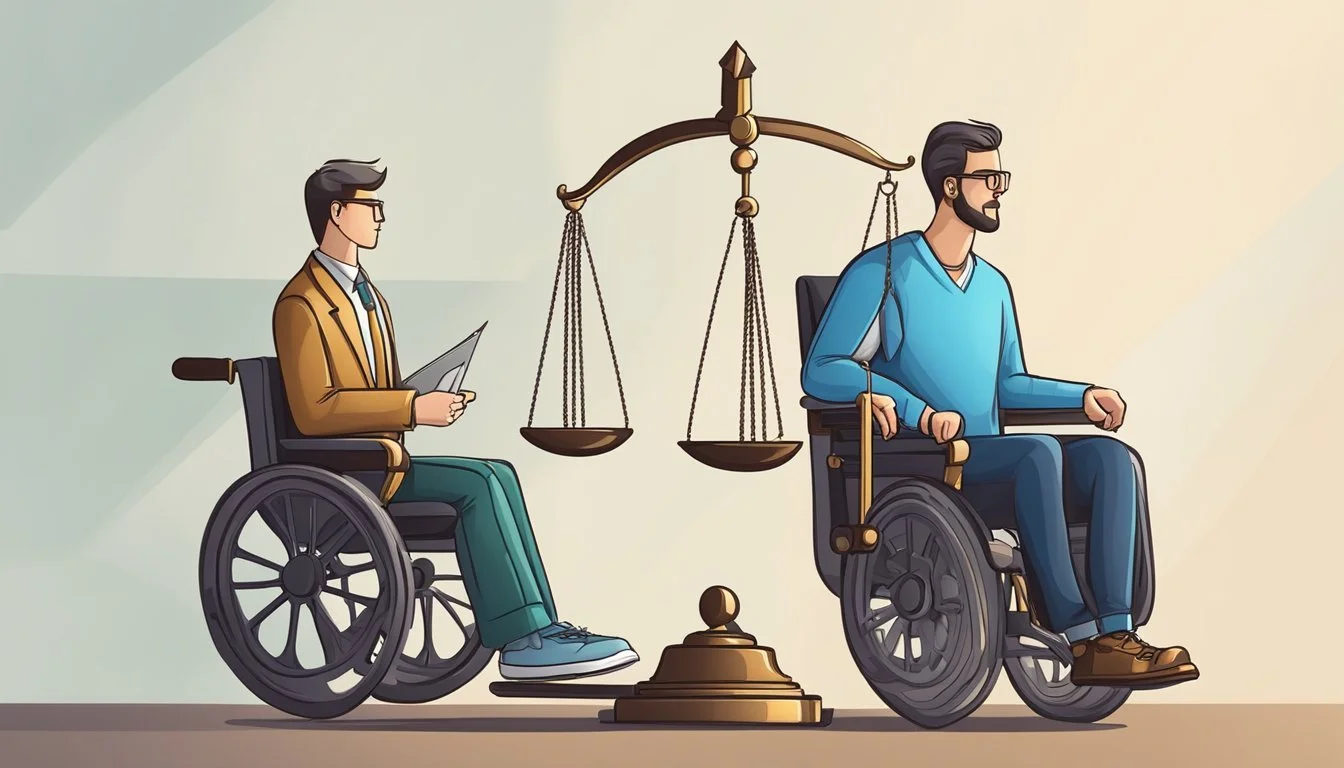Understanding OCD as a Recognized Disability
Obsessive-compulsive disorder (OCD) can significantly impact a person's daily life and ability to function. It causes intrusive thoughts and compulsive behaviors that interfere with work, relationships, and other essential activities. The Social Security Administration recognizes OCD as a qualifying condition for disability benefits.
Many individuals with OCD struggle to maintain employment due to the time-consuming nature of their compulsions or the distress caused by their obsessions. The Americans with Disabilities Act (ADA) also acknowledges OCD as a disability if it substantially limits major life activities. This classification provides legal protections and potential accommodations in the workplace.
While OCD can be deeply challenging, effective treatments are available. Cognitive-behavioral therapy, medication, and other interventions can help manage symptoms and improve quality of life. With proper support and treatment, many people with OCD can lead fulfilling lives and maintain employment. Those with severe cases may qualify for disability benefits to assist with their financial needs.
Understanding OCD
Obsessive-compulsive disorder (OCD) is a complex mental health condition characterized by intrusive thoughts and repetitive behaviors. It can significantly impact daily life and functioning for those affected.
Defining OCD and Its Symptoms
OCD is an anxiety-related disorder marked by persistent, unwanted thoughts (obsessions) and repetitive behaviors (compulsions). Obsessions are intrusive ideas, images, or urges that cause distress. Compulsions are ritualistic actions performed to alleviate anxiety.
Common obsessions include fears of contamination, doubts about safety, or unwanted violent or sexual thoughts. Compulsions often involve excessive cleaning, checking, counting, or arranging objects.
OCD symptoms can vary in severity and content. Some individuals may experience primarily obsessive thoughts, while others focus more on compulsive behaviors.
Categorization as a Disability
OCD can be considered a disability when it substantially limits major life activities. The Americans with Disabilities Act (ADA) recognizes OCD as a potential disability in workplace settings.
The Social Security Administration (SSA) also lists OCD as a qualifying condition for disability benefits. To meet disability criteria, OCD symptoms must be severe enough to interfere with work, social interactions, or self-care.
Not all cases of OCD are disabling. The impact on functioning determines disability status, not just the presence of symptoms.
Common OCD Compulsions and Obsessions
OCD manifests in various ways, with certain themes recurring across individuals:
Common Obsessions:
Contamination fears
Doubts about locking doors or turning off appliances
Disturbing sexual or violent thoughts
Need for symmetry or exactness
Common Compulsions:
Excessive hand washing or cleaning
Repeated checking of locks, switches, or appliances
Counting or arranging objects in specific patterns
Mental rituals like repeating words or prayers
Obsessions and compulsions often interlink. For example, contamination fears may lead to repeated hand washing. The severity and specific content can differ greatly between individuals.
Legal Framework for Disability Recognition
The legal recognition of OCD as a disability is governed by several key pieces of legislation. These laws establish protections and rights for individuals with OCD and other mental health conditions.
Americans with Disabilities Act (ADA)
The ADA prohibits discrimination against individuals with disabilities in various aspects of public life. It defines disability as a physical or mental impairment that substantially limits one or more major life activities. OCD falls under this definition when it significantly impacts a person's daily functioning.
The ADA requires employers to provide reasonable accommodations for qualified employees with disabilities. These may include flexible schedules, modified work environments, or assistive technology for individuals with OCD.
Public entities and businesses must also ensure equal access and opportunities for people with disabilities, including those with OCD.
The Rehabilitation Act and IDEA
The Rehabilitation Act of 1973 prohibits discrimination in federal programs and federally funded activities. Section 504 specifically protects individuals with disabilities, including those with OCD, in educational settings.
The Individuals with Disabilities Education Act (IDEA) ensures that students with disabilities receive appropriate educational services. It covers OCD when it adversely affects a student's educational performance.
IDEA mandates individualized education programs (IEPs) for eligible students, which may include accommodations and support services for OCD-related challenges.
Defining Major Life Activities
Major life activities are fundamental tasks essential for daily living. The ADA and other disability laws consider the impact of conditions like OCD on these activities when determining disability status.
Examples of major life activities include:
Working
Learning
Concentrating
Sleeping
Caring for oneself
Interacting with others
OCD can significantly affect these activities through intrusive thoughts, compulsive behaviors, and anxiety. The severity and frequency of OCD symptoms are considered when assessing their impact on major life activities.
Legal recognition as a disability often depends on how substantially OCD limits one or more of these activities in an individual's life.
Social Security Disability Benefits for OCD
Individuals with severe OCD may qualify for financial assistance through Social Security disability programs. These benefits can provide crucial support for those unable to work due to their condition.
SSDI and SSI Overview
The Social Security Administration (SSA) offers two main disability programs: Social Security Disability Insurance (SSDI) and Supplemental Security Income (SSI). SSDI is for individuals with a work history who have paid into the Social Security system. SSI is a needs-based program for those with limited income and resources.
Both programs provide monthly payments to eligible individuals. SSDI beneficiaries may also qualify for Medicare after a 24-month waiting period. SSI recipients typically receive Medicaid coverage immediately upon approval.
Qualification Criteria
To qualify for disability benefits due to OCD, applicants must meet specific medical and non-medical criteria:
Medical criteria:
Diagnosis of OCD by a qualified mental health professional
Symptoms severe enough to significantly impair daily functioning
Evidence of treatment attempts and response
Functional criteria:
Marked limitations in at least two of the following areas:
Understanding, remembering, or applying information
Interacting with others
Concentrating, persisting, or maintaining pace
Adapting or managing oneself
Duration requirement:
Condition must have lasted or be expected to last at least 12 months
The SSA evaluates OCD under Listing 12.06 (Anxiety and Obsessive-Compulsive Disorders) in their Blue Book of impairments.
The Application Process
Applying for disability benefits involves several steps:
Initial application:
Submit online, by phone, or in person at a local SSA office
Provide detailed medical records and work history
Medical evaluation:
SSA may request additional examinations or tests
Decision:
Initial decisions typically take 3-5 months
Approval rates are low for first-time applicants
Appeals process:
Request for reconsideration
Administrative law judge hearing
Appeals Council review
Federal court review
It's crucial to provide thorough documentation of OCD symptoms, treatment history, and functional limitations. Many applicants find it helpful to enlist the support of their treating physicians and mental health professionals throughout the process.
Medical Evidence for Disability Claims
Medical documentation plays a crucial role in OCD disability claims. Proper evidence supports the diagnosis, demonstrates symptom severity, and validates functional limitations.
The Importance of Medical Documentation
Comprehensive medical records form the backbone of successful OCD disability claims. These documents provide objective proof of the condition's impact on daily functioning. Key components include:
Detailed psychiatric evaluations
Therapy session notes
Medication histories and their effects
Psychological test results
Medical evidence should clearly outline OCD symptoms, their frequency, and intensity. It must also demonstrate how these symptoms interfere with work-related activities.
The Blue Book Listing for OCD
The Social Security Administration's Blue Book contains specific criteria for OCD disability claims. To meet the listing, applicants must show:
Involuntary, time-consuming preoccupation with intrusive thoughts
Repetitive behaviors aimed at reducing anxiety
Marked limitations in at least two areas:
Understanding, remembering, or applying information
Interacting with others
Concentrating, persisting, or maintaining pace
Adapting or managing oneself
Evidence must directly address these criteria to strengthen the claim.
Gathering and Presenting Evidence
Collecting robust medical evidence requires coordination with healthcare providers. Applicants should:
Request detailed reports from psychiatrists and therapists
Obtain records of all OCD-related treatments
Keep a symptom diary to supplement medical documentation
Include statements from family, friends, or employers about observed limitations
When presenting evidence, organize it chronologically and highlight information that aligns with Blue Book criteria. This approach helps claims examiners easily identify qualifying symptoms and limitations.
Treatments and Management of OCD
Effective OCD management involves a combination of therapeutic approaches and medication. These evidence-based treatments aim to reduce symptoms and improve quality of life for individuals with OCD.
Evidence-Based Therapies for OCD
Cognitive Behavioral Therapy (CBT) is a primary treatment for OCD. It helps patients identify and change negative thought patterns and behaviors associated with their obsessions and compulsions.
CBT often includes cognitive restructuring, which challenges irrational beliefs and fears. Patients learn to recognize their obsessive thoughts as manifestations of OCD rather than reflections of reality.
Mindfulness-based therapies can complement CBT by teaching patients to observe their thoughts without judgment. This approach can reduce the anxiety and distress triggered by obsessive thoughts.
Pharmacological Approaches
Selective Serotonin Reuptake Inhibitors (SSRIs) are the first-line medication for OCD. These antidepressants increase serotonin levels in the brain, which can help reduce obsessive thoughts and compulsive behaviors.
Common SSRIs prescribed for OCD include:
Fluoxetine
Sertraline
Paroxetine
Fluvoxamine
In some cases, doctors may prescribe other medications like clomipramine or augment SSRI treatment with antipsychotics for more severe symptoms.
Exposure and Response Prevention (ERP)
ERP is a specialized form of CBT considered the gold standard for OCD treatment. It involves gradually exposing patients to situations that trigger their obsessions while preventing the associated compulsive responses.
ERP sessions typically follow these steps:
Identify triggers
Create a hierarchy of feared situations
Expose patient to triggers in a controlled environment
Prevent compulsive responses
Practice until anxiety decreases
ERP can be challenging but highly effective. Many patients experience significant symptom reduction after completing a course of ERP therapy.
Disability Accommodations and Support
Individuals with OCD can access various accommodations and support services to manage their condition effectively. These include adjustments in educational settings, workplace modifications, and specialized rehabilitation programs.
Accommodations in Education
Students with OCD may qualify for academic accommodations under disability laws. Common adjustments include extended time on tests, separate testing rooms, and flexible attendance policies. Schools may provide note-taking assistance or recorded lectures to help students focus during class.
Some students benefit from modified assignment deadlines or alternative presentation formats. Educators can work with students to create individualized education plans (IEPs) or 504 plans that outline specific accommodations.
Workplace Accommodations and Rights
Employees with OCD are protected under the Americans with Disabilities Act (ADA). Reasonable accommodations may include flexible work schedules, frequent breaks, or modified work environments to reduce triggers.
Employers might provide noise-canceling headphones, private workspaces, or written instructions to accommodate OCD-related needs. Job restructuring or reassignment to a vacant position may be considered in some cases.
Workers have the right to request accommodations without fear of discrimination. The Job Accommodation Network offers free consulting services for employees and employers seeking accommodation solutions.
Accessing Rehabilitation Services
Rehabilitation services can help individuals with OCD develop coping strategies and improve daily functioning. These services may include cognitive-behavioral therapy, exposure and response prevention, or occupational therapy.
Vocational rehabilitation programs assist with job training, career counseling, and workplace integration. Some rehabilitation centers offer intensive outpatient programs specifically designed for OCD management.
Support groups and peer mentoring programs provide valuable connections and shared experiences. Many rehabilitation services can be accessed through mental health clinics, hospitals, or community organizations.
The Role of Advocacy and Legal Support
Advocacy and legal support play crucial roles in protecting the rights of individuals with OCD and ensuring access to necessary accommodations and benefits. These resources provide guidance, representation, and community support.
When to Consult a Disability Lawyer
A disability lawyer can be invaluable when navigating complex legal processes related to OCD disability claims. Consider consulting one if:
• Your initial disability claim is denied • You need help gathering medical evidence • You're preparing for a disability hearing • Your employer is not providing reasonable accommodations
Disability lawyers understand the nuances of OCD as a qualifying condition and can strengthen your case. They can help interpret Social Security Administration (SSA) guidelines and ensure all necessary documentation is submitted correctly.
Advocacy Groups and Mental Health Resources
Advocacy groups provide essential support and resources for individuals with OCD:
• The International OCD Foundation (IOCDF) offers an Advocate Program to raise awareness and educate the public • Local support groups create communities for sharing experiences and coping strategies • Mental health organizations provide education on OCD and related disorders
These groups often lead initiatives during OCD Awareness Week and work to influence public policy. They can connect individuals with valuable resources, including:
• Treatment providers specializing in OCD • Information on the latest research and treatments • Guidance on navigating workplace accommodations • Peer support networks
Engaging with advocacy groups empowers individuals to become active participants in their own care and broader OCD community efforts.
Living with OCD
OCD can significantly impact daily life, but with proper management strategies, support, and awareness, individuals can lead fulfilling lives. Many people with OCD develop effective coping mechanisms and find ways to thrive despite challenges.
Managing Daily Activities and Responsibilities
Individuals with OCD often face unique challenges in completing everyday tasks. Routines may be disrupted by intrusive thoughts or compulsive behaviors. Time management becomes crucial, as rituals can consume hours of the day.
To manage effectively, many people with OCD use scheduling tools and set time limits for compulsions. Breaking tasks into smaller, manageable steps can reduce anxiety and increase productivity.
Workplace accommodations may include flexible schedules, private workspaces, or regular breaks. These adjustments can help employees with OCD maintain focus and manage stress levels.
Community and Social Support
Support networks play a vital role in living with OCD. Family members and friends can provide emotional support and assist with daily tasks when symptoms are severe.
Support groups offer a safe space to share experiences and coping strategies. Many find comfort in connecting with others who understand their struggles firsthand.
Online communities provide accessible support options, allowing individuals to seek advice and encouragement at any time. These platforms can be especially valuable for those with limited local resources.
Overcoming Challenges and Stigma
Misconceptions about OCD can lead to stigma and discrimination. Educating others about the reality of living with OCD helps combat these issues.
Many individuals with OCD become advocates, sharing their experiences to raise awareness. This can involve speaking at events, writing blogs, or participating in mental health campaigns.
Seeking professional help is crucial for managing OCD. Cognitive-behavioral therapy and medication can significantly reduce symptoms and improve quality of life.
Learning to recognize and challenge OCD thoughts is an ongoing process. With practice, many people develop the skills to distinguish between OCD-driven concerns and realistic worries.




